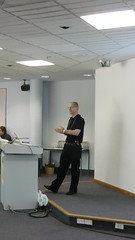Government reports as ebooks
I have long advocated providing government reports as a set of web pages, rather than as one big PDF file, as is typically done. However, government people are reluctant to do this.
One argument against web pages is that they are more difficult to make, but as I show my web design students, if you take an accessible approach to design, then this is not hard. If the document designer concentrates on making a document people can read online, where most will be read, rather than concentrating on producing a pretty printed report (which hardly anyone will see), then web format is a viable option.
Another argument is that web pages are not legal documents, which I explain to my electronic document students, is not true either. There is a commonly held, but incorrect, assumption that government reports must be in PDF format to stop them being edited. It is more difficult to edit a PDF file than a web page, but not impossible. In any case this is irrelevant to the protection of government reports.
But I suspect the real issue is that a set of web pages do not seem as real as a "book" and does not have the needed look of authority a government report demands. Collecting the web pages up into an ebook format may give them the needed gravitas. This could done with a three step process:
- Here is the printed report, see it looks like a proper printed document,
- Here is the ebook, see it looks like the printed report,
- Here is the web page, see it looks like a chapter from the ebook.
As discussed in my talk on "Making e-Books for e-Learning on i-Pads", the obvious e-book format to use is EPUB. This is based on XHTML and CCS as used by government web sites. It is also being popularised as a format by support on the Apple iPad. EPUB requires some extra XML files, but these supply information which agencies are required to provide anyway and should already have in their systems.
Convincing agencies to use an ebook format should be a lot easier than convincing them to use accessible web pages. Instead of having to explain why a whole lot of decorative junk is not a good idea and that instead information should be clearly and simply, it will be just a matter of saying "yest, that is a wonderful animated app, but unfortunately the ebook format does not support it".
There will be some inefficiencies, as ebooks are designed to be standalone. Therefore the CSS, logos and "about us" text which can be shared between web pages (and automatically inserted as required by a CMS) will have to be duplicated in each ebook. However, this duplication already occurs with PDF versions of reports, where fonts also contribute to the size of the resulting files.
Ebooks should also make archivists happy as they include their own metadata. In fact ebooks are conceptually similar to the archiving techniques used electronic archiving systems, which wrap up all the associated files of an e-document along with an XML encoded set of metadata.
The public could still read an individual chapter of a report as an ordinary web page. The system could also still provide automatically generated PDF, if anyone wants it. But if the web version is offered first in the list of options online, I suspect most people will be happy to download a few dozen kilobytes of the summary of a report, rather than megabytes of the full report in PDF. I might try out the idea with my students this year and see if the practice then diffuses into the Australian government.
Labels: #bcc2010, AGIMO, Apple iPad, Australian Government, Bar Camp, bcc2010, e-book reader, e-documents, Electronic Records Management, Government ICT


